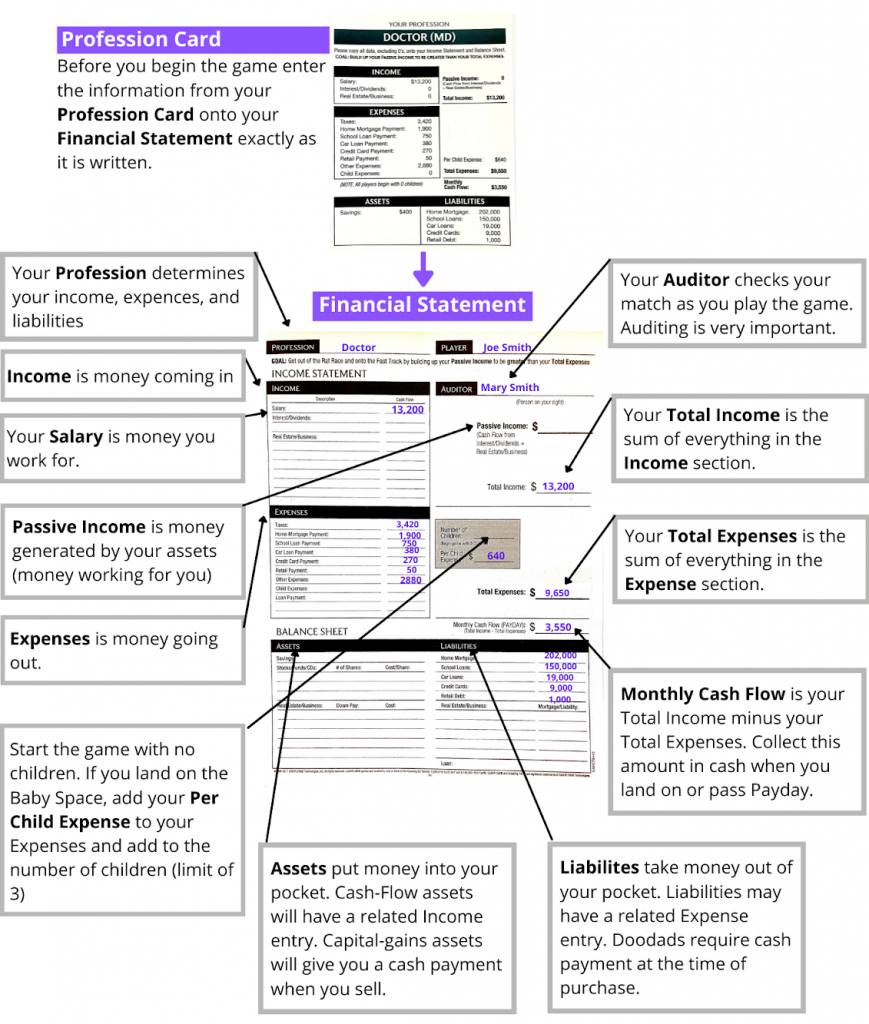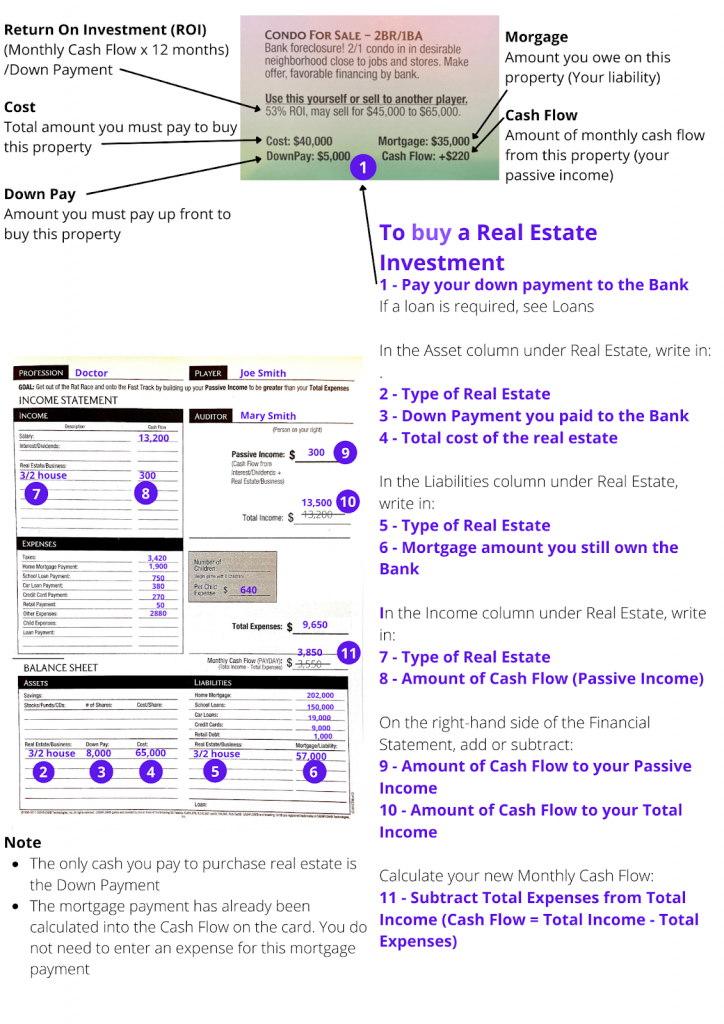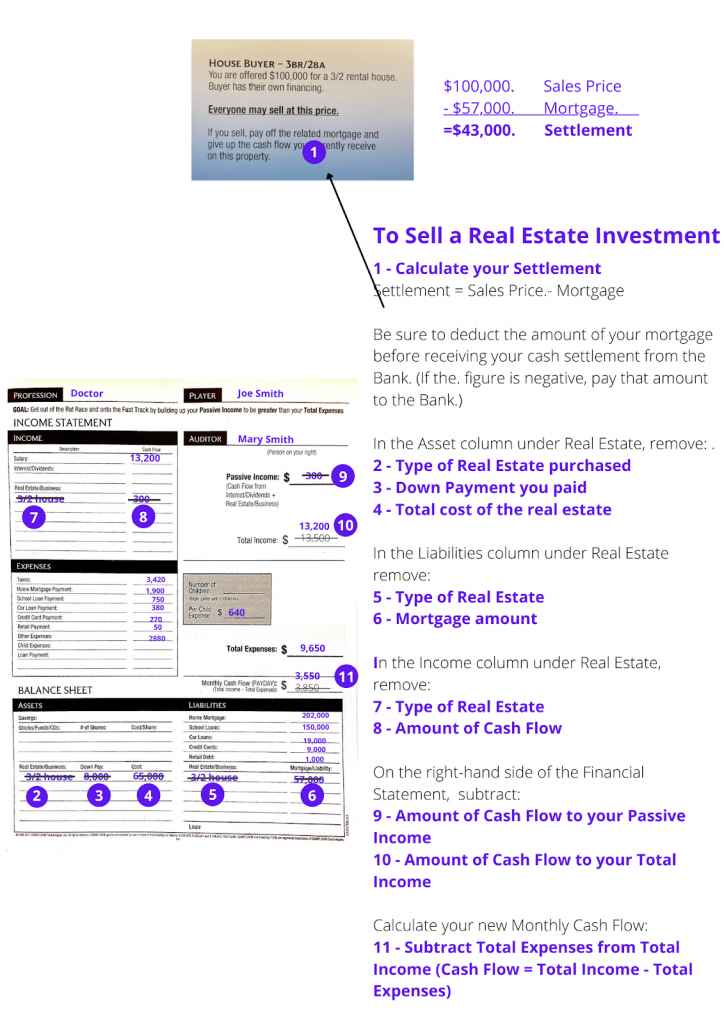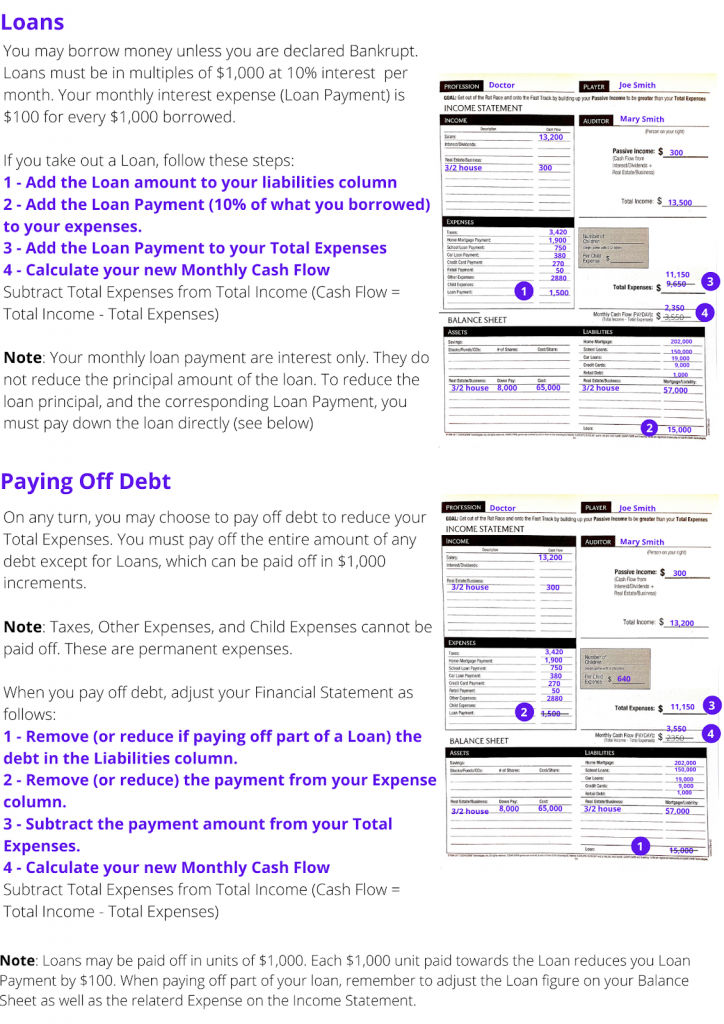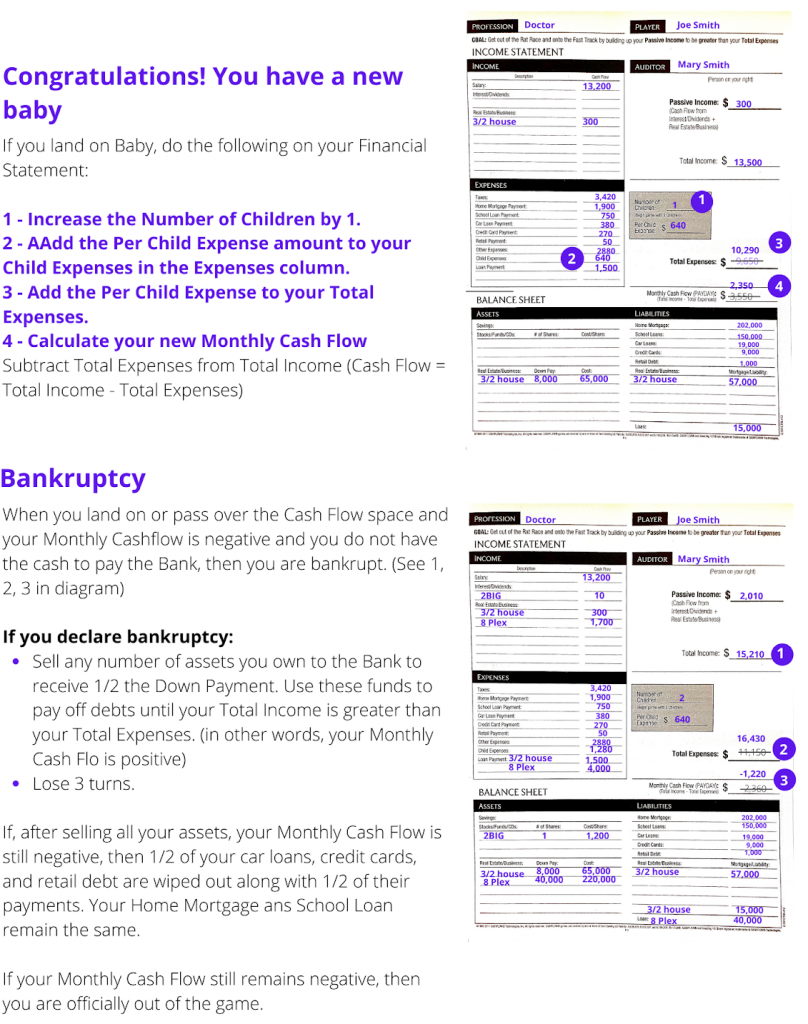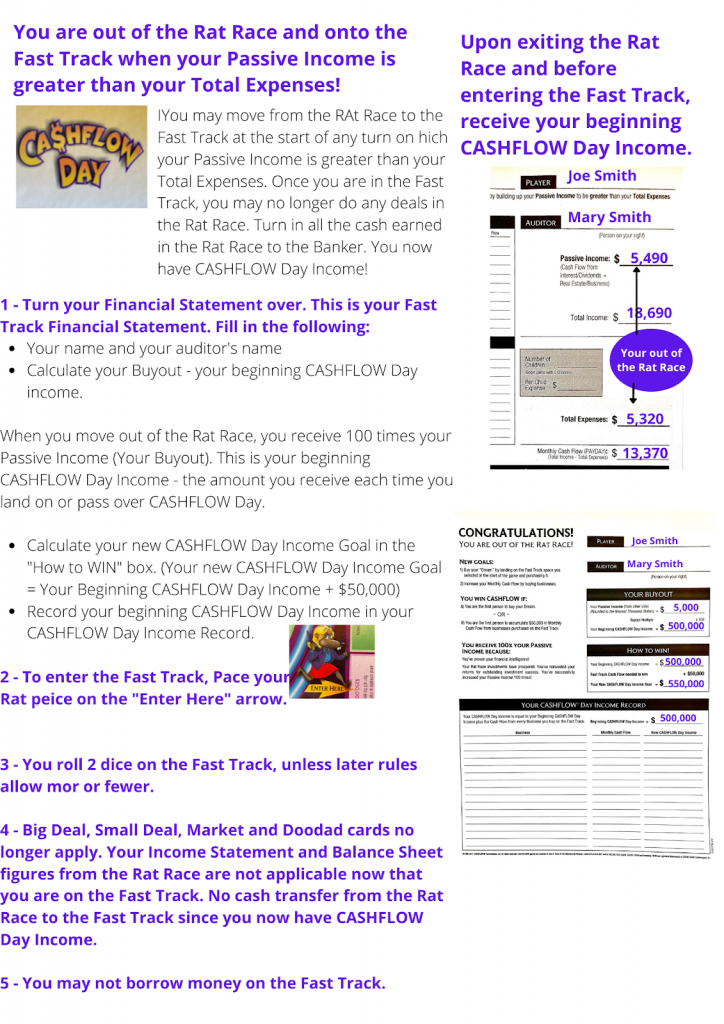CF101 Official Game Rules
In order to be able to credit points, the following rules of the game must be followed
- The game can only be played if the participants around the table agree on playing as individuals, not as a team.
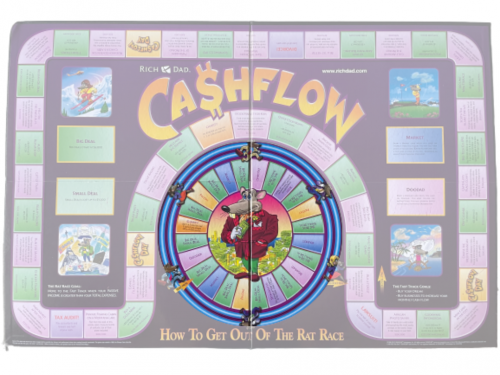
2. The “Rat Race” is the inner circle on the game board. (The Rat Race is where most of us are trapped day-in and day-out.)
Your goal is to get out of the Rat Race and onto the Fast Track. To get out of the Rat Race you must buy investments which give you cash flow (or passive income) so that your Passive Income is greater than your Total Expenses.
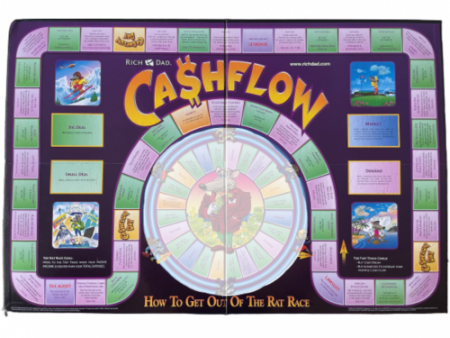
3. The Fast track is where the Rich play the game of money.
Once you’ve moved from the Rat Race to the Fast Track you can win the game if you are the first person to do one of the following:
BUY YOUR DREAM The Dreams are the pink spaces on the Fast Track
and/or
INCREASE YOUR MONTHLY CASH FLOW by $50,000
- Elect one Player to act as Banker. The Banker should be someone good with numbers and able to handle cash transactions quickly. If the Banker is also playing the game then they must keep their own game money separate from the money of the Bank.
- The Banker pays & receives all monies to and from players.
- Shuffle the Opportunity, The Market and Doodads cards. Place them face down on the game board on their marked places.
- Distribute one Income Statement/Balance Sheet to each Player. This is your “Game Card”. Take a moment to review the Game Card. Get familiar with the form and the words.
- Use the Income Statement/Balance Sheet side of your Game Card for the Rat Race portion of the game. The side of your Game Card labeled “Congratulations!” is used when you enter the Fast Track.
- Shuffle the Profession cards and randomly deal, face down, one to each Player. Distribute one pencil to each Player. Each Player then turns over their Profession card and enters the information from it, exactly as it is written, onto their Game Card.
- Note: Each Player starts the game with no bank loans, no bank loan payment, and no children.
- Meet your Auditor. This is the person on your right. The Auditor’s role is to assist you in making accurate calculations. Each time you make a change to your Game Card your Auditor must check your work.
- The Banker distributes cash to each Player. The amount of cash each Player receives at the beginning of the game is:
- The Player’s Monthly Cash Flow (income minus expenses, on your Game Card). Your Monthly Cash Flow is also your Paycheck. PLUS
- The Player’s Savings (listed on your Game Card). Your savings is only paid to you at the start of the game. Erase the savings amount from your Game Card once you receive it. Savings is not part of your Paycheck.
- You will have to follow the instructions on each space and card and not come up with any additional local rules.
- you can only sell a deal to anyone else if the card allows it or when required by bankruptcy.
Spaces on the Rat Race
Payday
 Your Payday is your Salary plus any Passive Income minus your Total Expenses. Each time you land on or pass Payday, you must ask for the amount of your monthly CashFlow from the Bank. If this amount is negative (minus), pay it to the Bank. The Payday period is one month, Cash you receive is added to you supply of cash on hand.
Your Payday is your Salary plus any Passive Income minus your Total Expenses. Each time you land on or pass Payday, you must ask for the amount of your monthly CashFlow from the Bank. If this amount is negative (minus), pay it to the Bank. The Payday period is one month, Cash you receive is added to you supply of cash on hand.
Big Deal / Small Deal
 Big Deal/Small Deal cards include a variety of investment opportunities that may help you in our quest to get out of the Rat Race.
Big Deal/Small Deal cards include a variety of investment opportunities that may help you in our quest to get out of the Rat Race.
 When you land on a Big Deal/Small Deal space you may choose either a Big Deal Card or a Small Deal card. The Big Deal begins at $6,000. The largest Small Deal costs $5,000.
When you land on a Big Deal/Small Deal space you may choose either a Big Deal Card or a Small Deal card. The Big Deal begins at $6,000. The largest Small Deal costs $5,000.
Read the card aloud. Every card is a learning opportunity. Some Deals may allow other Players to buy or sell assets as well.
If you don’t have enough cash, you may take out a loan (unless you are bankrupt).
Assets may only be sold when a card permits or when required by bankruptcy. Players may only sell assets they have already purchased.
The Big Deal/Small Deal cards you draw may be sold to another Player only if the card says so, and at a price negotiated between the players. (The player is selling the option to buy the investment listed) The player who buys the card must then buy the asset if offered at the price specified on the card at that time.
Deals expire when the next Player moves.
Market
 Market cards are where you’ll find buyers for our investments. Market cards also include economic events which may affect your financial position.
Market cards are where you’ll find buyers for our investments. Market cards also include economic events which may affect your financial position.
 When you land on a Market space, draw a Market card. Rac the card aloud. Everyone who has the exact asset mentioned on the card may sell at the specified price. If you sell, remember to adjust your Financial Statement accordingly. When you sell, you will receive your monies from the Bank on behalf of the buyer.
When you land on a Market space, draw a Market card. Rac the card aloud. Everyone who has the exact asset mentioned on the card may sell at the specified price. If you sell, remember to adjust your Financial Statement accordingly. When you sell, you will receive your monies from the Bank on behalf of the buyer.
Doodad
 Doodads are the unexpected and often unnecessary items on which you spend your money.
Doodads are the unexpected and often unnecessary items on which you spend your money.
 When you land on a Doodad space, draw a Doodad card and follow the directions. Doodads are mandatory, not optional. You may borrow from the Bank (see Loans) to pay Doodad bills.
When you land on a Doodad space, draw a Doodad card and follow the directions. Doodads are mandatory, not optional. You may borrow from the Bank (see Loans) to pay Doodad bills.
Charity
 Charity is optional. Upon landing on Charity you may choose to give 10% of your Total Income to Charity (Pay it to the Bank) in exchange for the use of 1 or 2 dice on each of your next 3 turns.
Charity is optional. Upon landing on Charity you may choose to give 10% of your Total Income to Charity (Pay it to the Bank) in exchange for the use of 1 or 2 dice on each of your next 3 turns.
Baby
 You have a new arrival to our family! When you land on Baby, do the following:
You have a new arrival to our family! When you land on Baby, do the following:
- Increase the Number of Children on your Financial Statement. There is a limit of 3 children per Player.
- Add the “Per Child Expense” on your Financial Statement to your “Child Expenses” in the Expenses column.
- Add your “Per Child Expense” to you Total Expenses.
- Calculate your new Monthly Cashflow.
Subtract Total Expenses from Total Income.
Cashflow = Total Income – Total Expenses - Have your Financial Statement audited
Downsized
 Landing on Downsized means you have temporarily lost your job! Pay the amount of your Total Expenses to the Bank and lose 2 turns. (This also ends the effect of Charity)
Landing on Downsized means you have temporarily lost your job! Pay the amount of your Total Expenses to the Bank and lose 2 turns. (This also ends the effect of Charity)
Your Financial Statement
Fill in the Financial Statement according to your Profession Card.
Buying a Real Estate Investment
Selling a Real Estate Investment
Buying and Selling Stocks / Mutual Funds /CDs
Options Available to Players in the Rat Race
Baby and Bankruptcy
The Fast Track
Spaces on the Fast Track
Cashflow Day
 Each time you land on or pass over Cashflow Day, you receive your CASHFLOW Day Income from The Bank. You do not have to ask for your CASHFLOW Day Income to receive it. If you forget it on the turn you land on or pass it, you still receive it.
Each time you land on or pass over Cashflow Day, you receive your CASHFLOW Day Income from The Bank. You do not have to ask for your CASHFLOW Day Income to receive it. If you forget it on the turn you land on or pass it, you still receive it.
Business Investments
 These are the green spaces on the Fast Track. You may purchase any business investment you choose by landing on the space, paying the Down Payment, and placing your token on the space. Once purchased, that business investment is no longer available to other players.
These are the green spaces on the Fast Track. You may purchase any business investment you choose by landing on the space, paying the Down Payment, and placing your token on the space. Once purchased, that business investment is no longer available to other players.
Note: If a business investment space involves rolling a die, that opportunity may be tried by any Player who lands on that space until a Player succeeds. Once a Player succeeds, then that oppor is no longer available to other Players.
When you invest in a business, be sure to:
- Place one of your colored tokens on the space you have purchased.
- Add the Business name, Monthly Cash Flow, and your new CASHFLOW Day Income on your Financial Statement.
- Have our auditor check your figures.
Dreams
 If you land on another Player’s chosen Dream, you have just increased the cost of that Dream to that Player by 100% of its original post. Place your token on their Dream. (You do not own this Dream)
If you land on another Player’s chosen Dream, you have just increased the cost of that Dream to that Player by 100% of its original post. Place your token on their Dream. (You do not own this Dream)
For example: You land on another Player’s chosen Dream and place your token on that dream. The Dream costs $125.000. When the Player who chose that Dream does land on it, they must now pay $125.000 + $125.000, or a total of $250.000 to buy their Dream. If a second Player lands on the same Player’s Dream, there would then be two tokens and the Player must pay $125.000 times three (or $375.000) to buy their Dream.
Charity
 Charity is optional. If you choose the Charity option, you may roll 1,2 or 3 diece for the rest of the game. You may select a different numbers of dice for each turn.
Charity is optional. If you choose the Charity option, you may roll 1,2 or 3 diece for the rest of the game. You may select a different numbers of dice for each turn.
Tax Audit
 Land on tax audit and pay out ½ of your cash on hand
Land on tax audit and pay out ½ of your cash on hand
Divorce
 Lose all your cash.
Lose all your cash.
Lawsuit
 This will cost you ½ of your cash on hand.
This will cost you ½ of your cash on hand.
Glossary
Definitions of the Game’s Financial Terms
ASSET: Something that puts money in your pocket, whether you work or not
AUTOMATED BUSINESS: A business which is run primarily by technology, not by people.
BALANCE SHEET: Your assets and liabilities (shown on the bottom portion of your Financial Statement).
CAPITAL: Cash or something of an agreed-upon value.
CAPITAL GAIN/LOSS: The difference between what you bought an investment for and what you sold it for, less improvements.
CASH FLOW: Cash coming in (Income) and cash going out (Expenses). It is the direction of cash flow that determines whether something is income, expense, asset, or liability.
CASH OFFER VS. FINANCED OFFER: Someone paying all cash versus someone paying a down payment and financing the remainder.
CCR (Cash-on-Cash Return): The calculation is the same as ROI.
CCR= (Monthly Cash Flow x 12) / Down Payment.
CERTIFICATE OF DEPOSIT: A loan to government and businesses, issued through banks, with specified maturity dates and interest rates.
DIVIDEND: A distribution of profits of a company to the shareholders.
DOODAD:Expenses, often unnecessary or unexpected, that take money out of your pocket.
DOWN PAYMENT: A percentage of the purchase price an investor pays upfront for an investment. The remainder of the price is financed through other means.
FORECLOSURE: A bank or individual takes your property for non-payment of the mortgage.
GOVERNMENT SAVING BOND: A loan an individual makes to the government in exchange for payment of interest on that loan.
INCOME STATEMENT: A form showing your income and expenses, also called a profit-and-loss Statement (shown on the top portion of your Financial Statement)
INFLATION:An economic situation where consumer prices rise while the value of the currency falls.
IPO (Initial Public Offering): The first time a company offers shares of stock to the general public.
LIABILITY: Something that takes money out of your pocket.
LIMITED PARTNERSHIP: A legal entity set up to hold assets. Allows limited liability for limited partners.
MARKET: This is where products are bought and sold
MORTGAGE: The real estate property you are financing is used as collateral against the amount of money you are borrowing. The mortgage is the security instrument.
MUTUAL FUND: A variety of stocks, bonds, or securities, grouped together, managed by an investment firm and purchased by individual investors through spares. The shares possess no direct ownership value in the various companies.
PASSIVE INCOME: Income generate from your assets (investments) with minimal work, such as interest, dividends, and real estate rentals.
REIT (Real Estate Investment Trust): Similar to a mutual fund. Deal solely in real estate.
ROI (Return on Investment): Calculate as an annual figure by multiplying monthly cash flow x 12 (months). divided by the Down Payment.
ROI = (Monthly Cash Flow x 12) / Down Payment
Example: an apartment building costs $500,000. You pay $100,000 as a down payment. You have a monthly cash flow of $2,000.
ROI = ($2,000 x 12) / $100,000 = 0,24 = 24%
SHARES SPLIT: A corporate action where the number of share you own increases, and te pris per share decreases.
STOCK SHARE: A share of stock represents ownership in a corporation. The shareholders (those people owning stock in a company) are the actual owners of the company.
TAX LIEN (Property): A legal claim on a property for unpaid taxes.
TAX-DEFERRED EXCHANGE (1031 Exchange): A method of buying and selling real estate that allows you to defer payment of taxes on your capital-gains profit. (1031 refers to the U.S Tax Code).
TRADING RANGE: The average high and low prices of an investment.
